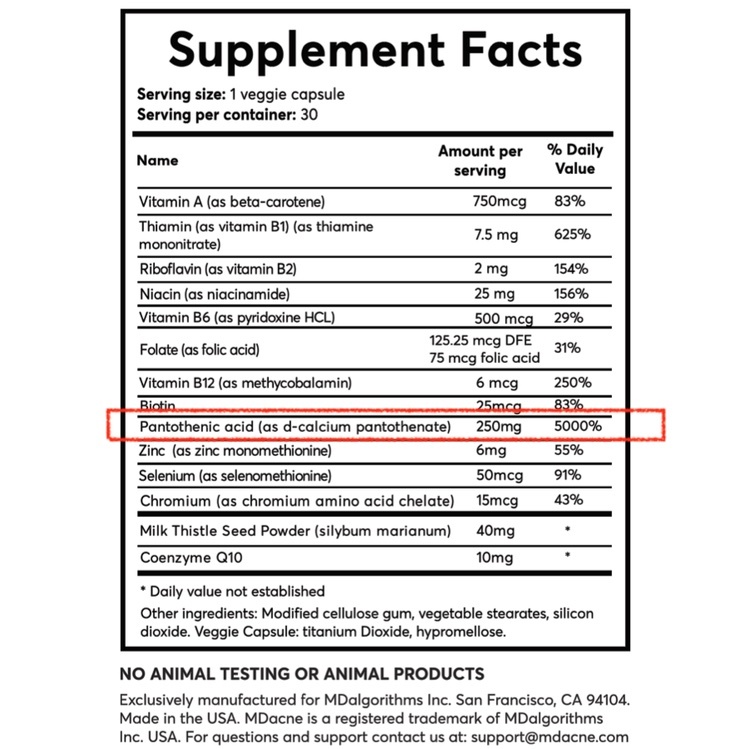Pantothenic acid (vitamin B5) for acne treatment

What is Pantothenic Acid?
Pantothenic acid, or Vitamin B5, is one of the essential B-complex vitamins. Its primary role is to help convert lipids, proteins, and carbohydrates into energy. But it does so much more! Vitamin B5 supports healthy hair, skin, and eyes while reducing oil production and stress levels—two major acne triggers.
How Does Pantothenic Acid Help with Acne?
Vitamin B5 tackles acne on multiple fronts:
- Oil Control: Through its role in coenzyme A (CoA) metabolism, B5 reduces oil production by promoting sebum breakdown in the skin’s oil glands.
- Improved Skin Barrier: It enhances the skin’s epidermal barrier function, helping to prevent acne breakouts.
- Stress Reduction: Stress is a known acne trigger, and B5’s ability to help manage stress indirectly supports clearer skin.
The Research Behind Vitamin B5 and Acne
- Study #1: Volunteers taking a daily oral dose of a B5-based supplement saw a 50% reduction in acne pimples after just 8 weeks.
- Study #2: A larger randomized controlled trial showed a 67% reduction in acne lesions after 12 weeks of supplementation.
These findings highlight the significant potential of Vitamin B5 as a natural acne solution.
Is Pantothenic Acid Safe to Use?
Absolutely! Vitamin B5 is water-soluble, meaning your body flushes out any excess through the urinary system. According to the US National Institutes of Health (NIH), B5 is safe even at high doses. However, very high doses (10,000 mg/day) can cause minor side effects like an upset stomach, diarrhea, or bright yellow urine.
Pantothenic Acid vs. Accutane
While Accutane (derived from Vitamin A) is a potent acne treatment, it comes with a laundry list of side effects and requires a prescription. Pantothenic acid offers a safer, natural alternative for mild to moderate acne, though Accutane remains the gold standard for severe cases.
How Much Vitamin B5 Should You Take for Acne?
There’s no formal dosage recommendation for acne treatment, but studies suggest:
- Starting Dose: 250 mg per day, gradually increasing if needed.
- Maximum Dose: 2-4 grams per day for more pronounced results.
Always consult a healthcare provider before starting high-dose supplements.

What’s the Best Form of Pantothenic Acid?
The ideal supplement should:
- Use vegetable capsules (easier to swallow and free of aftertaste).
- Contain d-calcium pantothenate—the active form of Vitamin B5.
- Include complementary vitamins and minerals, such as Vitamins B1, A, B2, B3, zinc, selenium, and chromium, for enhanced absorption and effectiveness.
Pro Tip: Avoid supplements with large amounts of biotin, as it can worsen acne.
Combining Vitamin B5 with Topical Treatments
For optimal results, pair your Vitamin B5 supplements with a comprehensive topical skincare routine:
- Cleanser: Use a gentle acne cleanser with salicylic acid to unclog pores.
- Moisturizer: Opt for an oil-free, non-comedogenic moisturizer to hydrate without clogging pores.
- Treatment Cream: Look for medical-grade anti-acne creams that target inflammation and redness.
How Long Until You See Results?
With consistent use of Vitamin B5 supplements like MDacne’s Skin Clearing Vitamins, you can expect:
- Initial Improvement: Around 4–6 weeks.
- Significant Results: By 12 weeks.
- Dermatologists recommend using acne supplements for at least 6 months for the best results.
The Benefits of MDacne’s Skin Clearing Vitamins
MDacne’s Skin Clearing Vitamins offer a high dose of d-calcium pantothenate (Vitamin B5) alongside a carefully curated blend of complementary nutrients:
- B1: Enhances B5 absorption.
- Zinc and Selenium: Reduce inflammation and support healing.
- Vitamin A: Controls oil production and promotes cell renewal.
- Chromium: Helps balance blood sugar levels, reducing acne triggers.
FAQs About Pantothenic Acid and Acne
Q1: Can I combine Vitamin B5 with Accutane or other medications?
A: Yes! Vitamin B5 is safe to combine with most treatments, but always consult your dermatologist for personalized advice.
Q2: Is Vitamin B5 better than Accutane for acne?
A: Vitamin B5 is a safer, natural alternative for mild to moderate acne. Accutane is best reserved for severe, treatment-resistant cases.
Q3: How do I know if Vitamin B5 is working?
A: Watch for reduced oiliness and fewer breakouts after 4–6 weeks of consistent use.
Q4: Can I stop taking Vitamin B5 once my skin clears up?
A: To maintain results, continue taking a maintenance dose and stick to your skincare routine.
Q5: Can I find Vitamin B5 in foods?
A: Yes! Foods like eggs, avocados, and whole grains contain B5, but supplements ensure you get the therapeutic dose needed for acne.
Final Thoughts: The Natural Solution for Acne-Prone Skin
Vitamin B5 is a scientifically backed, natural solution for managing acne. From reducing oil production to supporting skin healing, it’s a safe and effective way to achieve clearer skin. Pair it with a tailored skincare routine and a healthy lifestyle for the best results. Ready to give your skin the love it deserves? MDacne’s Skin Clearing Vitamins might just be your new go-to.
Say goodbye to breakouts and hello to confidence!
More info: The best vitamins and minerals for people with acne
References:
Kelly GS. Pantothenic Acid. Monograph. Altern. Med Rev. 2011;16(3):263–274.
To find the right supplements for your unique skin, take the free skin assessment by clicking here.



